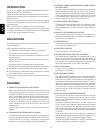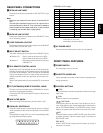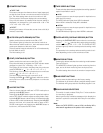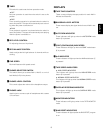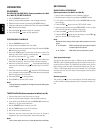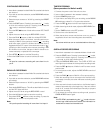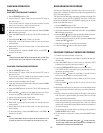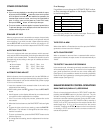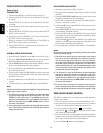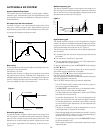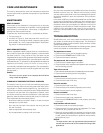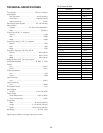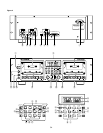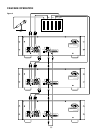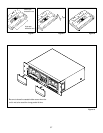
16
English
English
REPAIRS
Only the most competent and qualified technicians should be
allowed to service your unit. Marantz and its factory trained
warranty station personnel have the knowledge and special
equipment needed for repair and calibration of this precision
instrument.
In the event of difficulty, call the toll-free telephone number listed
on the face of the warranty to obtain the name address of the
Marantz Authorized Service Center nearest you. In many cases,
the dealer where you purchased your Marantz unit may be
equipped to provide service. Please include the model, serial
number of your unit together with a copy of your purchase re-
ceipt and a full description of what you feel is abnormal in its
behavior.
TROUBLESHOOTING
Should faults occur, it is in many cases not necessary to consult
your dealer or technical service department. On the basis of
the following checks you will be able to rectify a number of faults
yourself without difficulty.
If the fault cannot be remedied after the following check, please
consult your dealer or nearest Marantz service agent.
The tape does not travel.
1. Check that the power cord is plugged properly.
2. Check that the POWER switch is set to ON.
3. Check that the tape is rewound.
The tape travels, but no sound is output.
1. Check that the cassette tape is recorded.
2. Check that the mixer, amplifiers and speakers are connected
and functioning properly.
Tape will not record.
1. Check that the protection tabs of cassette tape are not broken.
2. Check that the recording level is set properly.
Sound is distorted.
1. Check that the recording level is not too high.
2. Check that the head is not dirty.
Sound is unstable.
1. Check that the head is not dirty.
2. Check that the pinch wheels (capstans) are not dirty.
3. Check that the tape is wound regularly.
Noise is noticeable.
1. Check that the head is not dirty.
2. Check that the head is not magnetized.
3. Check that the DOLBY NR switch is set properly according
to the tape.
Hum interferes with the sound.
1. Check that cords are connected properly.
2. Check that there is not any source of magnetism (TV, motor,
transformer, etc.) placed near the unit ?
3. When this unit and amplifier are stacked, hum noise is some-
times generated depending on the amplifier model. In such
a case, place the components in positions where interfer-
ence does not occur.
NOTICE
The tape counters are only approximate measurements of
minutes and seconds and are not intended for timing-critical
applications.
CARE AND MAINTENANCE
This section describes the care and maintenance tasks that
must be performed to optimize the operation of your Marantz
equipment.
MAINTENANCE
HEAD CLEANING
If the heads are not cleaned for a long period, dirt or dust may
be deposited on the heads and capstans, causing degraded
high-frequency characteristics, volume drop, or degraded re-
cording and erasure performances.
To prevent this, clean the heads, etc., periodically as follows.
1. Turn the power off.
2. As shown in Figure 10, clean the parts which come in con-
tact with tape, including the heads, capstans, tape guides,
pinch wheels, etc., with a cotton swab soaked in head clean-
ing solution or denatured alchohol.
HEAD DEMAGNETIZATION
When a magnetized metallic objects (such as a screwdriver tip,
etc.) comes in contact with a head or capstan, or when the deck
has been used for a long period of time, the head may be
magnetized and noise may be generated. If the head is extremely
magnetized, the high frequencies in recorded tapes could even
be erased due to it. To prevent this, demagnetize the heads and
capstans periodically (every 20 hours of use) using a
commercially-available head demagnetizer. (For the operation,
please refer to the instruction manual supplied with your head
demagnetizer.)
Caution:
Be sure to turn the power of the cassette deck off before
using a head demagnetizer.
CLEANING OF EQUIPMENT EXTERNAL SURFACES
The exterior finish of your unit will last indefinitely with proper
care and cleaning. Never use scouring pads, steel wool, scour-
ing powders or harsh chemical agents (e.g., lye solution), al-
cohol, thinners, benzine, insecticide or other volatile substances
as these will mar the finish of the equipment. Likewise, never
use cloths containing chemical substances. If the equipment
gets dirty, wipe the external surfaces with a soft, lint -free cloth.
If the equipment becomes heavily soiled:
– dilute some washing up liquid in water, in a ratio of one part
detergent to six parts water
– dip a soft, lint free cloth in the solution and wring the cloth
out until it is damp
– wipe the equipment with the damp cloth
– dry the equipment by wiping it with a dry cloth



